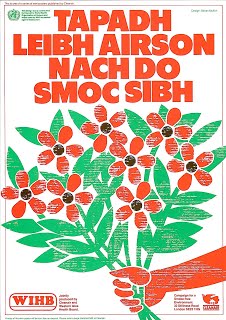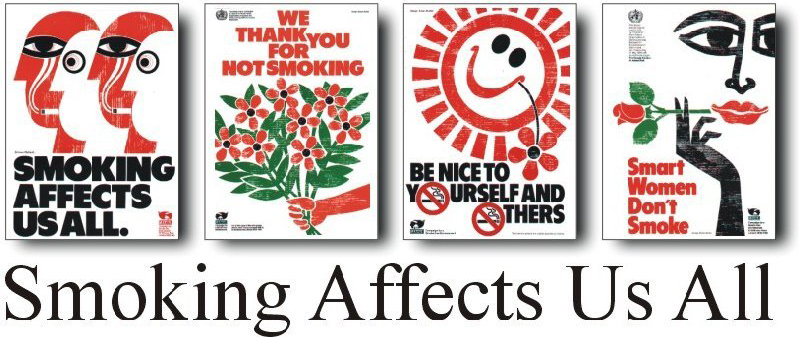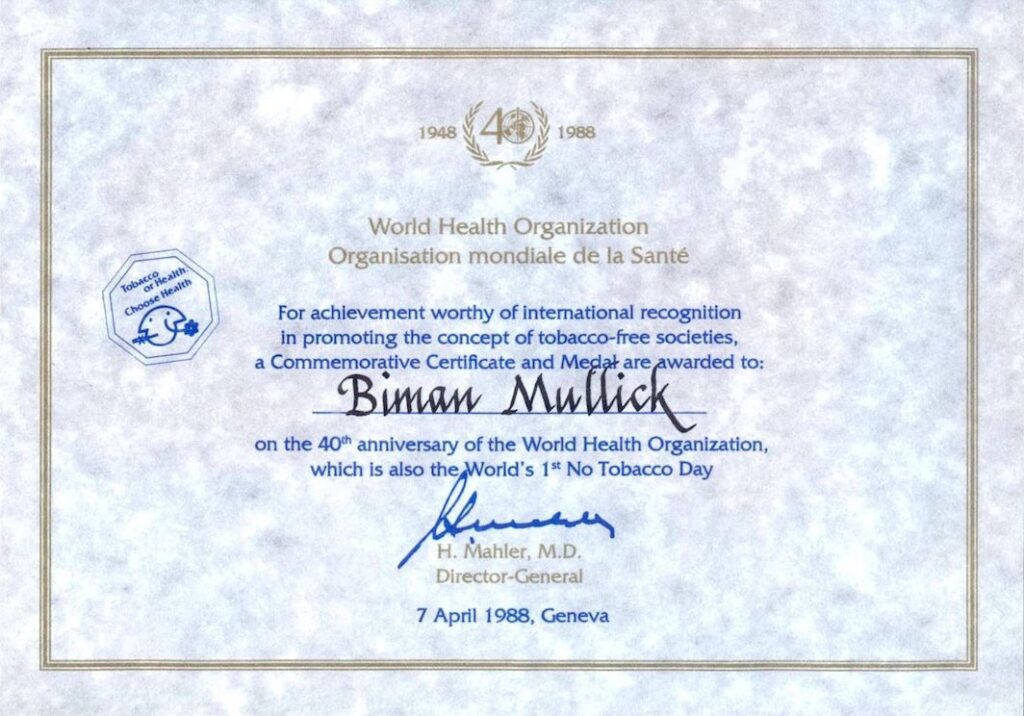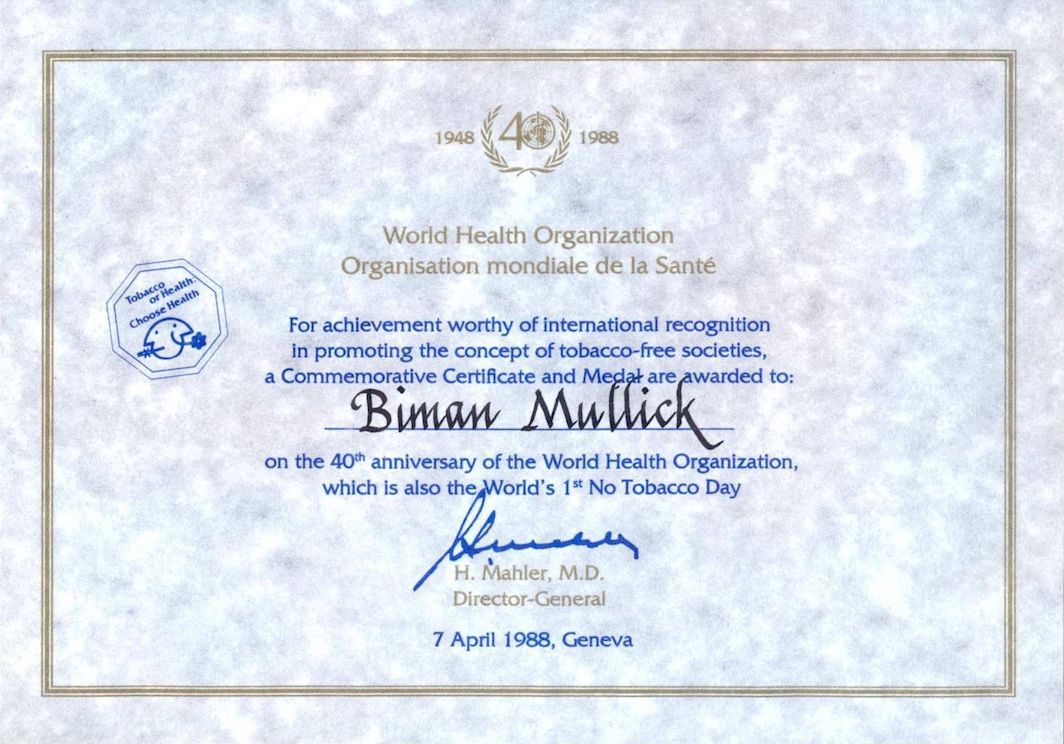Cleanair Campaign
Biman Mullick (Honorary Director, Cleanair) presents Cleanair’s views to the ‘Framework Convention on Tobacco Control’ (FCTC)
organized by the World Health Organization (WHO),
at the hearing on 12/13 October 2000 in Geneva, Switzerland.
This report was forwarded by the WHO to all heads of countries.
Therefore:
- Cultivation: The harvest of tobacco should be drastically reduced and severely restricted. A limited amount of tobacco could be grown under license and under controlled conditions for medical use, research purposes and production of insecticide and similar useful products. Growers should be advised and aided in producing useful food products. All governments and their relevant departments must work together towards achieving this goal. 10 million acres of prime agricultural land are used to grow tobacco; that much land can grow enough food to feed 12 million people.
- Ecology: Wood should not be burnt to cure tobacco. Each year as much as 11.4M acres of forest are destroyed as wood is taken for curing the tobacco. Each acre of tobacco needs as much as 300 trees. This is about 26 trees per year, which are destroyed for the average smoker. Deforestation reduces rainfall and increases soil erosion. Forests have been systematically destroyed in India, Kenya, Tanzania and Sudan to meet the demand of the Tobacco Industry.
- Production: Manufacturers of tobacco products should be encouraged to diversify their business interests and to move into the production of goods beneficial to mankind.
- Sale: The sale of tobacco products must be restricted. Tobacco products may only be sold by licensed retailers to holders of permits and prescriptions. Permits and prescriptions may be issued to people who have a temporary need to use tobacco.
- Promotion of Tobacco: All forms of direct and indirect advertising and promotion of tobacco products to be immediately stopped.
- The Media: Portrayal of tobacco use by the media should be done with responsibility and proper justification. Use of tobacco products, particularly smoking, must not be shown as a normal activity that gives abuse of tobacco as a natural, respectable and even desirable activity.
- The Drug: Tobacco is a drug and must be classified and to be treated as such.
- Drug Abuse: Smoking, taking snuff, chewing tobacco and any other form of tobacco consumption to be called ‘abuse of tobacco’. All tobacco abusers to be recognised as drug dependents and to be called as such instead of ‘smokers’. The term ‘smokers’ gives the totally wrong impression.
- Medical Help: All tobacco dependents to be given free medical and other appropriate help and assistance to free themselves from addiction. Smoking Affects Us All: Tobacco smoke is harmful to all, whether one voluntarily smokes or is involuntarily forced to inhale it from a tobacco polluted environment.
- Child Abuse: Smoking in front of a child should be considered as child abuse and a criminal offense. Therefore, the offender to be punished by law of the land.
- Smoke-free Environment: All areas that are frequented by public to be made completely smoke-free. Smoking in public should not be permitted. Smoking in public to be regarded as an infringement of the basic human right to breathe clean air. This measure is not designed to prevent tobacco addicts from smoking but to protect ordinary people from health hazards created by tobacco-smoke pollution.
- Smoking only among consenting adults: Smoking and other form of tobacco abuse may be tolerated among consenting adults in their complete privacy as long it does not affect the rest of the community, who need to breathe clean air.
- Transport: All public transport to be free from tobacco-smoke pollution. But on long distance journeys space to be provided for clinically dependants of tobacco products. The space to be physically separated in such a way that no other fellow passenger will be affected from tobacco-smoke pollution.
- Work place: Similar arrangements may be provided in work place.
- World leaders: All heads of government must understand that tobacco trade may bring a short term financial benefit to the nation but it can not be justified against health and environmental issues.
- Education & Information: Health and environment topics should be compulsory in primary and secondary education programmes and the effect of tobacco on health and the environment must be included in the curriculum.
- Visual Communication: Cleanair believes in picture power. Education and information programmes must use the universal language of visual images along with printed words on posters and informative literature. A massive worldwide campaign to be launched to combat tobacco-ism.
- Legislation: All governments must use their legislative power to implement measures to eliminate smoking in public.
- Taxation: Tax on tobacco products brings revenue to the nation’s treasury. A small increase of tax on tobacco brings revenue but has very little long-term effect on health. Sadly the community which can ill afford to spend on tobacco is the biggest user of tobacco products. A considerable tax increase in tobacco products would be an effective measure against the tobacco epidemic.
About Us

33 Stillness Rd.
London SE23 1NG. UK.
Phone: +44(0)20 8690 4649.
Cleanair
Campaign for a Smoke-free Environment is an independent, voluntary and non-profit-making organization engaged in drawing public attention to smoking and its effect on health and the environment.
WHO Award
7 April 1988 was the 40th anniversary of the WHO, and was also the World’s First No Tobacco Day. To mark the occasion, the WHO honoured 11 organizations and 29 individuals with Commemorative Certificates and Medals ‘for achievement worthy of international recognition in promoting the concept of tobacco-free societies.’ Biman Mullick, the honorary director of Cleanair, was one of the recipients. He was specially chosen ‘for establishing Cleanair, a voluntary non-profit organization, and for creating a series of posters that politely, strongly and humorously deliver the message that Non-Smoking is the Norm.’
Funding
Cleanair receives no grant from private or public funds for its regular work and is mainly run by dedicated professionals who give their services free of charge. It accepts contributions for specific projects and also depends on the sale of its publications.
This article is illustrated with images from Cleanair posters designed by Biman Mullick. Posters with different sizes and languages such as French, Spanish, Gaelic, Bengali, Hindi, Urdu, Gujarati, Punjabi, Somali and Turkish are available from Cleanair.
Cleanair
Campaign for a Smoke-free Environment is an independent, voluntary and non-profit-making organization engaged in drawing public attention to smoking and its effect on health and the environment.
WHO Award
7 April 1988 was the 40th anniversary of the WHO, and was also the World’s First No Tobacco Day. To mark the occasion, the WHO honoured 11 organizations and 29 individuals with Commemorative Certificates and Medals ‘for achievement worthy of international recognition in promoting the concept of tobacco-free societies.’ Biman Mullick, the honorary director of Cleanair, was one of the recipients. He was specially chosen ‘for establishing Cleanair, a voluntary non-profit organization, and for creating a series of posters that politely, strongly and humorously deliver the message that Non-Smoking is the Norm.’
Funding
Cleanair receives no grant from private or public funds for its regular work and is mainly run by dedicated professionals who give their services free of charge. It accepts contributions for specific projects and also depends on the sale of its publications.
Information on Cleanair is available at www.ezme.com/cleanair. The full text is published by the WHO, the World Health Organization HERE.
This article is illustrated with images from Cleanair posters designed by Biman Mullick. Posters with different sizes and languages such as French, Spanish, Gaelic, Bengali, Hindi, Urdu, Gujarati, Punjabi, Somali and Turkish are available from Cleanair.






